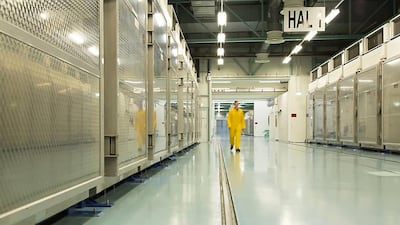Iran has resumed uranium enrichment at its underground nuclear plant near Qom, raising the prospect of another international crisis over the country's nuclear programme.
A government spokesman told the semi-official Mehr news agency on Monday that accelerated enrichment was under way.
"A few minutes ago, the process of producing 20 per cent enriched uranium started in Fordow enrichment complex," Ali Rabiei said.
Iranian Foreign Minister Mohammed Javad Zarif later confirmed the news on Twitter.
He said the International Atomic Energy Agency (IAEA) has been "duly notified" and claimed the action was in line with the 2015 Joint Comprehensive Plan of Action (JCPOA).
The announcement added to international concern that Iran is not interested in revitalising the JCPOA, commonly known as the nuclear deal.
The UK and EU hop to revive some form of the deal, which lifted trade sanctions, except on some Iranian organisations accused of direct links to terrorist groups.
In exchange, Iran provided UN inspectors with access to its nuclear facilities.
"Iran enriching uranium to 20 percent at Fordow is a clear attempt to increase its campaign of nuclear extortion, an attempt that will continue to fail," a US State Department spokesperson said after the news.
The US pulled out of the deal and reimposed tough sanctions in 2018, unhappy with so-called sunset clauses which would have allowed Iran to restart nuclear activity.
Washington has also insisted that Iran continues to sponsor terrorist organisations in the region, a point the EU and UK agree with.
The International Atomic Energy Agency (IAEA) would only say that it was aware of Iran's plan and that a full report would be released late on Monday.
"We have confidence that the IAEA will monitor and report on any new Iranian nuclear activities," the spokesperson at the US State Department said.
In Brussels, a European Commission representative said that the "move, if confirmed, would constitute a considerable departure from Iran's commitments".
"All participants are interested in keeping deal alive. The deal will be kept alive as long as all participants keep their commitments," the official told Reuters.
UN spokesman Farhan Haq on Monday urged Iran to comply with the terms of the 2015 nuclear deal and to cooperate with the world body's atomic energy watchdog, the IAEA.
Speaking with reporters in New York, Mr Haq also encouraged all nations to avoid any steps that "contribute to any kind of escalation" in tensions over Tehran's uranium enrichment.
The office of Israeli Prime Minister Benjamin Netanyahu tweeted on Monday that Iran's decision "can't be explained in any way except as continued realisation of its intention to develop a military nuclear programme".
Mr Netanyahu reiterated a long-standing position that Israel would not allow Iran to develop such a weapon.
Iran had previously informed the IAEA that plans were under way to further enrich nuclear material, from “low enriched” to “medium enriched”, or 20 per cent enrichment, a step away from being able to create weapons-grade uranium.
On December 31, a representative for the Vienna-based IAEA said Iran had told the agency the accelerated enrichment programme would begin at Fordow, about 90 kilometres south-west of Tehran.
Work at the vast underground site, thought to be able to house 3,000 centrifuges for uranium enrichment, has created speculation over the years that Israel might launch a pre-emptive attack on Iranian nuclear sites, to prevent Iran moving more work underground.
Underground centrifuges would be almost invulnerable to aerial attack.
Because of this, Israel was said to be planning to launch a commando raid to destroy the site, as a potential alternative to air strikes, if war was decided upon as a course of action.
Some US congressmen have pushed to transfer special bunker-busting bombs to the Israelis, but Israel has instead preferred to mount a covert sabotage campaign against Iranian nuclear facilities, in addition to killing nuclear scientists.
Of the latter, the assassination of Mohsen Fakhrizadeh on November 27 sparked international controversy.
According to the last report available from the IAEA, published in November, Tehran was enriching uranium to levels greater than the 3.67 per cent limit provided for in the 2015 nuclear deal , but not exceeding the 4.5 per cent threshold.
The announcement that 20 per cent enrichment is planned will lead to concerns that Iran will be able to reach 90 per cent enrichment for its uranium stocks, sufficient for a nuclear device.









